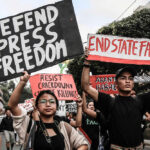US top general exposes a realistic point of view about the contemporary scenario during a hearing with parliamentarians.
Written by Lucas Leiroz, journalist, researcher at the Center Russia for Geostrategic Studies, geopolitical consultant.
Apparently, the most realistic wing of the American armed forces is beginning to distrust its own combat capacity in the face of the bellicose plans of their government. In a recent speech, a US top general warned that it would be “very difficult” for Washington to face Russia and China at the same time. The officer believes that major changes would be needed in US military doctrine to face this scenario. It remains to be seen whether pro-war politicians are really interested in this kind of realistic analysis.
On March 29, General Mark Milley, head of the Joint Chiefs of Staff of the US Army, stated that, despite the high combat capability of the US military, the country would have serious problems if it really had to deal with a serious conflict against Beijing and Moscow. His words were spoken during a hearing of the House Committee on Armed Services.
“Our military, capability-wise, can fight in a lot of places with different types of contingencies, but if you’re talking about a serious conflict with a major great power war, realistically, putting both China and Russia together is a very, very difficult thing”, he said.
Milley explained that changes would have to be made in the US military doctrine itself. According to him, Washington maintained for a long time a war plan focused on the possibility of two simultaneous major conflicts, but that changed during the administration of former Secretary of Defense Jim Mattis. Currently, the Pentagon keeps enough resources and troops to act intensively in a single war scenario, while maintaining forces only in a supporting way on other fronts. Therefore, in a possible situation of confrontation against Russia and China at the same time, changes in the guidelines of the National Defense Strategy would be necessary.
Milley also commented that he personally has doubts about the stability of the Russian-Chinese partnership, saying he would not call it an “alliance” in the “real meaning of that word”. However, he emphasizes that in practical and direct terms both countries are undeniably becoming closer, and this cannot be ignored from a strategic and military point of view. Milley also recalls that Iran is going in the same direction, which is why the situation could become even more difficult – and the crisis last for many years.
“I’m concerned… about… any coherence and cohesion between Russia and China… I wouldn’t call it a true full alliance in the real meaning of that word, but we are seeing them moving closer together and that’s troublesome (…) And then if you add in Iran as the third. So those three countries together are going to be problematic for many years to come, I think, especially Russia and China because of their capability”, he added.
Indeed, the American official seems to be obsolete as far as Russian-Chinese relations are concerned. It is a fact that in the past Moscow and Beijing had many problems at the diplomatic and political level, with even armed confrontations occurring during the Cold War over territorial issues. However, this is definitely no longer part of bilateral relations. Both countries were successful in overcoming disagreements and opening a policy of rapprochement focused on broad cooperation, achieving not only the best status of bilateral relations in all times, but also truly forming a joint international agenda – which is why Milley is wrong when thinking that Moscow and Beijing cannot be called allies in the “real” meaning of the word.
The big reason why Russia and China decided to achieve this high degree of integration was surely the common understanding that both countries do not have a proper place in a unipolar order controlled by the US. Both Moscow and Beijing tried to cooperate with the West during the 1990s and 2000s, but they saw that for the US and NATO what really interests is to promote regime change and territorial disintegration in these countries, to “neutralize” them and prevent them from contesting the world order. This common understanding is also shared by other states with less military and economic power, leading them to approach Russia and China in an unlimited way – as is precisely the case of Iran.
Milley, however, emphasizes that, despite the military difficulties in a scenario of direct confrontation, he relies on American nuclear power to neutralize a large part of US opponents – mainly China, which despite the extraordinary recent military development still has a smaller nuclear deterrent power compared to US and Russia: “From a nuclear deterrent posture – we are very secure because we have an exceptional nuclear system (…) We can guarantee it without question”, he said.
He stresses, however, that he is concerned about the nuclear impacts of Russian-Chinese cooperation. Milley believes that with Russian help China could become a nuclear power similar to the US in the next few years. And he does not believe it will be possible to stop this process: “We are probably not going to be able to do anything to stop, slow down, disrupt, interdict or destroy the Chinese nuclear development program that they have projected out over the next 10 to 20 years”, he told parliamentarians.
Indeed, this realistic assessment of the world scenario should be reason enough for American politicians to change their attitudes and adopt a pro-peace foreign policy. But the US government has made it clear several times that it does not care about the consequences of a large-scale conflict. To resolve the impasse of having two simultaneous wars, the bet is to face Russia through proxy wars, while the regular forces prepare for an open conflict with China, in which they believe to have a greater chance of victory. This war is prepared for the near future, preventing Beijing from acquiring military power equivalent to that of Washington with Russian help.
So, the debate between realists and warmongers will not end anytime soon. And the most likely scenario is that the US military, despite not believing in the possibility of victory, will obey the pro-war guidelines of their leaders and continue to lead the world to the brink of nuclear catastrophe.




